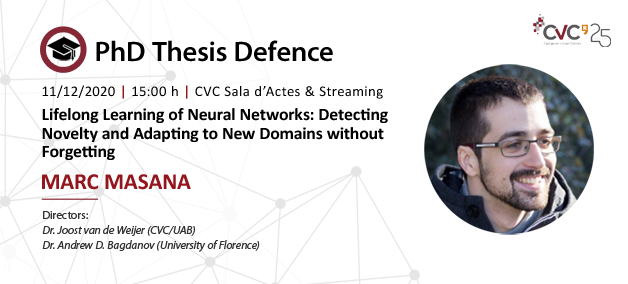
CVC has a new PhD on its record!
Marc Masana successfully defended his dissertation on Computer Science on December 11, 2020, and he is now Doctor of Philosophy by the Universitat Autònoma de Barcelona.
What is the thesis about?
Computer vision has gone through considerable changes in the last decade as neural networks have come into common use. As available computational capabilities have grown, neural networks have achieved breakthroughs in many computer vision tasks, and have even surpassed human performance in others. With accuracy being so high, focus has shifted to other issues and challenges. One research direction that saw a notable increase in interest is on lifelong learning systems. Such systems should be capable of efficiently performing tasks, identifying and learning new ones, and should moreover be able to deploy smaller versions of themselves which are experts on specific tasks. In this thesis, we contribute to research on lifelong learning and address the compression and adaptation of networks to small target domains, the incremental learning of networks faced with a variety of tasks, and finally the detection of out-of-distribution samples at inference time.
We explore how knowledge can be transferred from large pretrained models to more task-specific networks capable of running on smaller devices by extracting the most relevant information. Using a pretrained model provides more robust representations and a more stable initialization when learning a smaller task, which leads to higher performance and is known as domain adaptation. However, those models are too large for certain applications that need to be deployed on devices with limited memory and computational capacity. In this thesis we show that, after performing domain adaptation, some learned activations barely contribute to the predictions of the model. Therefore, we propose to apply network compression based on low-rank matrix decomposition using the activation statistics. This results in a significant reduction of the model size and the computational cost. Like human intelligence, machine intelligence aims to have the ability to learn and remember knowledge. However, when a trained neural network is presented with learning a new task, it ends up forgetting previous ones. This is known as catastrophic forgetting and its avoidance is studied in continual learning. The work presented in this thesis extensively surveys continual learning techniques and presents an approach to avoid catastrophic forgetting in sequential task learning scenarios.
Our technique is based on using ternary masks in order to update a network to new tasks, reusing the knowledge of previous ones while not forgetting anything about them. In contrast to earlier work, our masks are applied to the activations of each layer instead of the weights. This considerably reduces the number of parameters to be added for each new task. Furthermore, the analysis on a wide range of work on incremental learning without access to the task-ID, provides insight on current state-of-the-art approaches that focus on avoiding catastrophic forgetting by using regularization, rehearsal of previous tasks from a small memory, or compensating the task-recency bias. Neural networks trained with a cross-entropy loss force the outputs of the model to tend toward a one-hot encoded vector. This leads to models being too overly confident when presented with images or classes that were not present in the training distribution. The capacity of a system to be aware of the boundaries of the learned tasks and identify anomalies or classes which have not been learned yet is key to lifelong learning and autonomous systems. In this thesis, we present a metric learning approach to out-of-distribution detection that learns the task at hand on an embedding space.
Keywords: computer vision, machine learning, neural network compression, out-of-distribution detection, continual learning.













